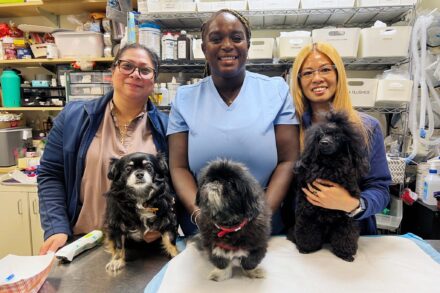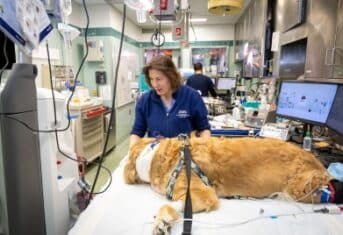Kidneys on Our Minds

Kidneys on Our Minds
The news has been full of stories about kidneys recently. The Oregon Zoo’s male black rhinoceros, Pete, sadly succumbed to kidney disease and the Seattle Times reported the Woodland Park Zoo’s male Sumatran tiger, Rakata, was euthanized, like Pete, for kidney failure.
The FDA continues to warn dog owners about the dangers of imported chicken jerky treats. Reports indicate they are associated with a rare kidney disorder called Fanconi-like syndrome.
Because The AMC understands the prevalence and serious nature of kidney disease and has a world-renowned specialist on staff who deals specifically with the kidney function of dogs and cats, we have become the U.S. hub for treatment in the northeast. In fact, The Animal Medical Center recently hosted more than 150 national and international attendees at the Advanced Renal Therapies Symposium 2012 (ARTS 2012) –the only veterinary conference devoted entirely to disease of the kidney.
All kidney diseases are not the same
Even though kidney dysfunction is a common thread in the illnesses of Pete, Rakata, and dogs eating chicken jerky treats from China, the underlying disorders are quite different. Pete suffered from hemochromatosis, a disorder common to black rhinos and one where excessive amounts of iron are stored in the body, damaging internal organs such as the kidneys and liver. Zookeepers treated Pete by changing his diet and monitoring his response using blood tests. In dogs and cats with kidney disease, a diet change is one of the most important therapeutic tools veterinarians have to treat the disease.
Tigers are just like your cat
Rakata, the tiger, had kidney disease associated with old age, very similar to what veterinarians at The AMC diagnose in our geriatric feline patients. The kidneys gradually lose their normal functions of conserving water for the body and filtering out waste products of protein metabolism. Initially, the cat owner sees increased urine production, increased drinking, and when the disease progresses, cat owners may notice weight loss and a bad smell coming from their cat. This smell comes from a combination of accumulated toxins and the oral ulcers commonly seen in kidney failure. In pet cats with chronic kidney disease, veterinarians prescribe fluids, special diets, and medications to lower phosphorus, treat anemia and manage kidney failure-induced gastric ulcers.
Jerky and leaky kidneys
Fanconi-like syndrome is a strange kidney disorder where sugar (glucose) is found in the dog’s urine even though the dog is not diabetic. An unknown component of the chicken jerky treats seems to be damaging the kidneys, causing them to leak not only glucose, but amino acids, protein and electrolytes as well. If owners continue feeding the chicken jerky treats, the kidneys can be permanently damaged. Early elimination of the chicken jerky treats from the diet appears to reverse this disorder. This is a preventable form of kidney disease–simply avoid feeding your dog chicken jerky treats manufactured in China.
Fixing kidneys
With all these types of kidney disease, it is not surprising The AMC would host a conference like ARTS 2012, focused on better treatments for kidney disease. When this conference started in 2006, The AMC had only intermittent hemodialysis. We now have continuous renal replacement therapy, charcoal perfusion for removing substances toxic to the kidneys, and are investigating stem cell therapy for cats with IRIS Stage III kidney disease.
Let’s hope all these efforts are successful and we won’t have to think about kidney disease again. If you can’t avoid thinking about kidneys or have a pet with kidney disease, contact our renal medicine specialists for more information about their services or the recent ARTS Symposium at 212-329-8618.
________________________________________________________
This may also be found in the Tales from the Pet Clinic blog on WebMD.com.
For over a century, The Animal Medical Center has been a national leader in animal health care, known for its expertise, innovation and success in providing routine, specialty and emergency medical care for companion animals. Thanks in part to the enduring generosity of donors, The AMC is also known for its outstanding teaching, research and compassionate community funds. Please help us to continue these efforts. Send your contribution to: The Animal Medical Center, 510 East 62nd Street, New York, NY 10065. For more information, visit www.amcny.org. To make an appointment, please call 212.838.7053.


































